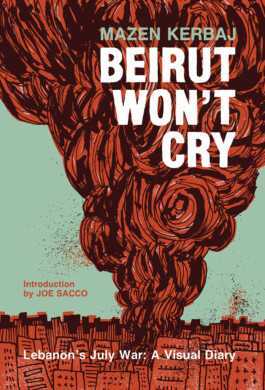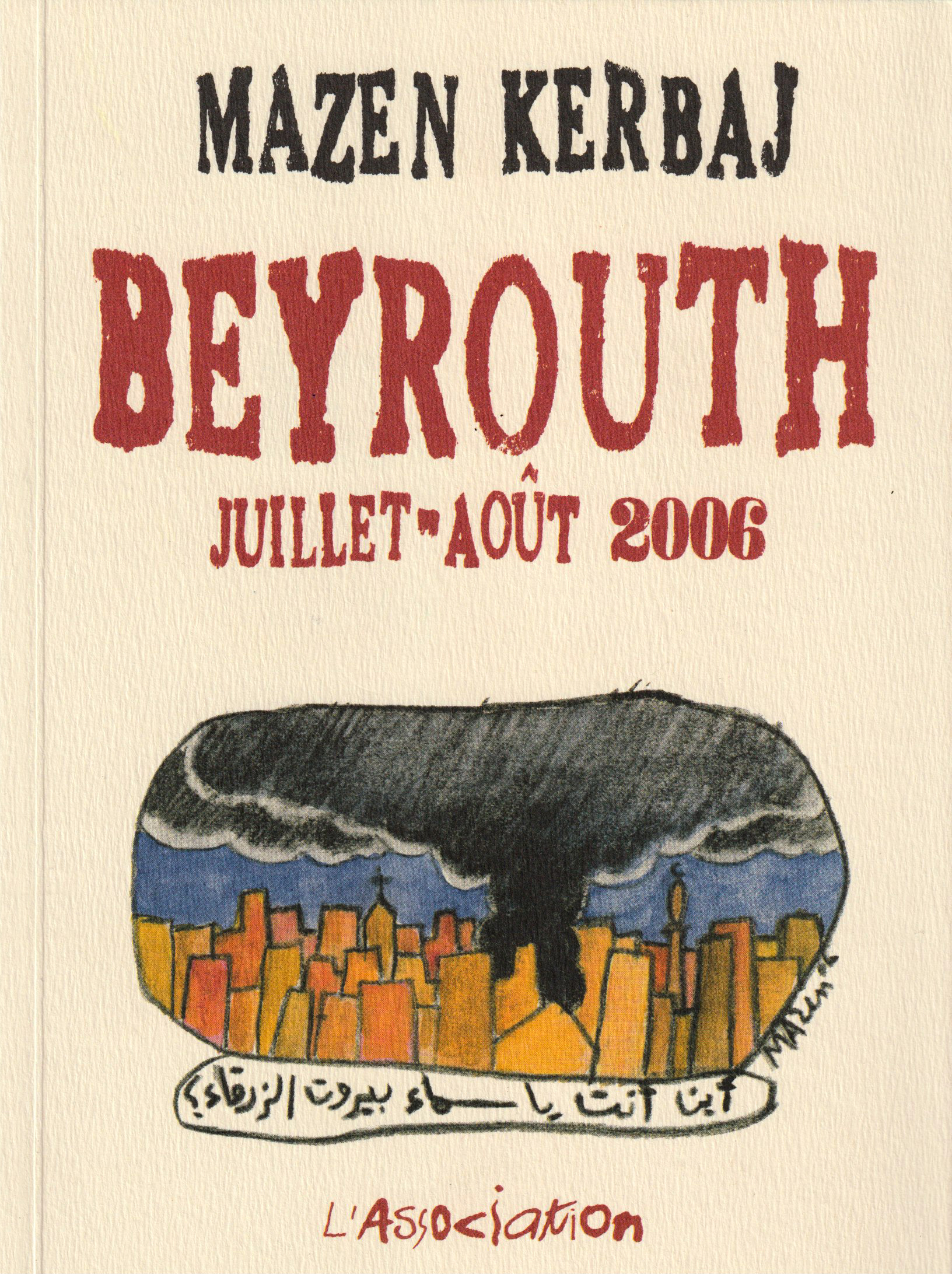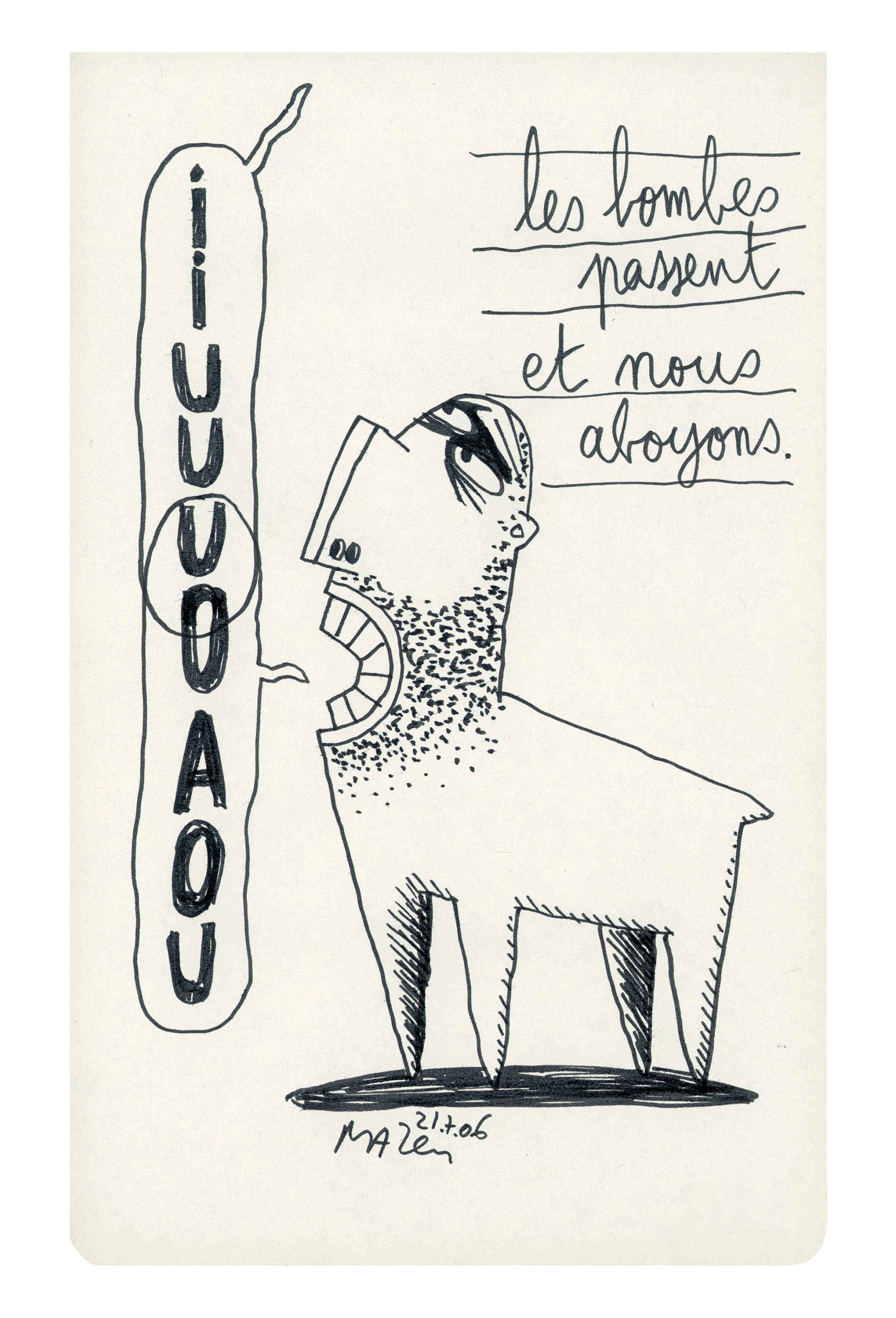Beirut won't cry


















COVER OF THE ENGLISH EDITION
COVER OF THE FRENCH EDITION
COVER OF THE ARABIC EDITION
each night, from my bed, i hear beirut disappearing
baby boom
real news from beirut
Bombs pass and we bark
come down!
it is not us
kids meat
on the 20th day
Today 40 wooden numbered boxes were moved from the city of Tyre to under the city of Tyre
you, him and me
finally together
A new emerging species: the Man-Light.
accounting
watching sponge bob with my son evan
we resist
description
A diary of the 2006 war in Lebanon told in drawings, comics and prose.
Throughout the summer of 2006, during the Israeli attack on Lebanon, Mazen Kerbaj published drawings, comics, and writing giving a first-hand account of someone creating during a time of intense everyday brutality. Drawn and written in English, French, and Arabic, Beirut Won’t Cry shows us how an artist views the world and everything in it — his relationships, his family, and his creative pursuits — as it violently crumbles around him. Both historically vital and hilarious, Beirut Won’t Cry introduces Mazen Kerbaj’s unique voice and urgent pen.
INTRODUCTION To the english edition
In His Own Way
(An Introduction by Joe Sacco)
“We are so fucking used to living in this shit,” Mazen Kerbaj tells us in Beirut Won't Cry, the published recreation of his superb wartime blog, and I doubt any man, woman, or child living in Lebanon would argue with his weary sentiment. Lebanon has always lived with the effects of regional conflict – including the influx and settling of large refugee populations – and suffered from wars by proxy on its own soil. A Lebanese born in, say, 1960 would be able to recall the arrival of the Palestine Liberation Army, the 15-year sectarian civil war, the 1982 Israeli invasion and occupation, the Sabra and Shatila massacre of Palestinians by Israel’s Christian allies, the suicide bombing of the intervening United States marines, and the rise of Hezbollah and its expulsion of the Israeli army.
In Lebanon, unfortunately, there is always more to come, and in 2006 a cross-border raid that led to the death and capture of Israeli soldiers by Hezbollah precipitated yet another brutal round. Israeli retribution has always been fearsome, and its aerial attacks during the so-called July War, documented here by Mazen, were no exception.
Mazen insists this is not a book about politics, and it is not. If he shakes his fist at Israeli bombers he does not offer a political assessment of why they are there or examine the claims and counterclaims of the protagonists. He simply vents his anger at those who are dropping bombs on him and his dearest ones, like any civilian who suddenly becomes the fodder of an omnipotent air force might. Mazen knows that he is what we in the West refer to as “the other,” those whom we do not mourn and scarcely consider. And if he seems, on closer inspection, more “like us” (he is, after all, a highly caffeinated, whiskey-drinking jazz musician from the cosmopolitan bubble that exists in a certain part of Beirut) and thus worthy of empathy, he might bristle at a further mischaracterization. Mazen, his family, his friends, his son, and his lover are neither “the other” nor “like us” – they are themselves and it is by virtue of their naked, vulnerable, individual humanity that they deserve our rapt attention.
So what we have here are quick notes and dispatches, scribbled drawings smudged with coffee and finely rendered cartoons, bitter or sardonic, humorous or despairing, with captions and word balloons in one or another of Beirut’s languages – Arabic, French, or English -- produced in extremis, under the bombs. None of this was created reflectively; Mazen did not know what tomorrow or the next hour had in store whenever he took pen in hand. The immediacy of this work pushes us into Mazen’s shoes, but even as his concerns and worries become our own, he reminds us that bombs are cutting people down elsewhere in Lebanon, too, in Tyre and the long-suffering southern villages.
“I try to be a fucking witness,” he writes. “To show a little bit of what’s happening here. In my own way.” Mazen pushes himself past his exhaustion and succeeds. We now know something about him and the good people of Beirut and Lebanon, and perhaps we will remember it the next time they are under the bombs.
INFO
Publisher: Fantagraphics (English) / L'Association (French) / Snoubar Bayrout (Arabic)
Size: 20x14cm
Language: English, French and Arabic
Number of pages: 264
Cover: Colour
Inside: Colour and Black and White
exhibitions
The drawings from Beirut Won't Cry were shown in various ways all over the world.
During the 33 days war, Kerbaj encouraged the visitors of his blog to share the drawings by all possible means, including printing them and sticking them on the walls of their cities, to raise awareness about the catastrophic situation.
After the war, the originals have been exhibited on various occasions in galleries, art spaces and museums.






















At the new museum, new york (2014)
At the new museum, new york (2014)
At the maxxi museum, rome (2017)
At the maxxi museum, rome (2017)
At the maxxi museum, rome (2017)
At villa bernasconi, Geneva (2018)
At villa bernasconi, Geneva (2018)
At villa bernasconi, Geneva (2018)
at cacsa, adelaide (2008)
at cacsa, adelaide (2008)
at cacsa, adelaide (2008)
at university of Maryland college park, Baltimore (2009)
at university of Maryland college park, Baltimore (2009)
at university of Maryland college park, Baltimore (2009)
in the streets of madrid (2006)
in the streets of madrid (2006)
in the streets of lisbon (2006)
in the streets of amsterdam (2006)
in the streets of amsterdam (2006)
in the streets of barcelona (2006)
in the streets of barcelona (2006)
in the streets of an unidentified city (2006)
interview about the war drawings for the saradar colection (2016)
Press excerpts
Note: this book, and especially the blog where all the drawings and texts have been published in real time in 2006, have triggered an enormous amount of press articles and academic studies; they can be obtained upon request.
Kerbaj's cartoons convey the complex mixture of emotions he experienced during the war. In stark black-and-white drawings, he carries his audience on his journey from despair to anger to apathy and back again—along with brief but happy respites to visit his son and ex-wife in the mountains beyond Beirut.
[World Literature Today]
The drawings are funny, feverish, heart-breaking, angry, delirious, absurd, tragic, fuelled by booze, fear, sleepless nights and—importantly—love and friendship. In heavy black ink or in colour, in a combination of French, English and Arabic, they are utterly devastating. I like to think of them as postcards from Beirut to the outside world.
[Saradar Collection]
Kerbaj's drawings evoke the soundscape of a Beirut under siege. The emotional, sometimes satirical drawings take the author's anxieties, hopes, drunkenness, anger, playfulness, exhaustion, and hyper-caffeination and transmute them into human and humanesque figures.
[Bookwitty]
Les dessins poétiques de Mazen Kerbaj posent des questions simples, parfois provocantes.
[Le Monde]
A seminal visual diary of the summer 2006 Israeli war on Lebanon.
[Sounder]
Throughout the book, each of Kerbaj's single-panel drawings bristles with angry, anxious, and loud creativity.
[Qantara]
La grandeur de ce livre n’est pas dans la cause qu’il sert mais dans sa beauté ; être parvenu à cette beauté dans le moment même où tout cela arrivait, dans le moment même où Beyrouth subissait les bombes, c’est la victoire de l’humanité de Mazen Kerbaj.
[Du 9]
Obwohl die Leser des Jahres 2017 wissen, wie der Krieg ausgegangen ist, vermittelt das Buch sehr gut die alltägliche Dringlichkeit der damaligen Lage. Nach elf Jahren Abstand vermittelt dies beim Lesen allerdings ein etwas hilfloses Gefühl: Wir hören, wie Kerbaj uns zum Handeln aufruft und uns bittet, seine Botschaft zu verbreiten. Aber dazu ist es jetzt über ein Jahrzehnt zu spät.
[Qantara]
Mazen Kerbaj’s Beirut Won’t Cry grabs you with its chaotic, atmospheric art immediately, reflecting a traumatic time of uncertainty (the 2006 Lebanon War). Kerbaj’s powerful words and drawings speak for the living and the dead, so that both are never silenced.
[Virginia Library Association]
His entries onto Kerblog are a heady mix of despair, wit, and the determination to persevere.
[Electronic Intifada]
His work has gained much attention throughout the world, and has been praised for placing a human-face on the grim media portrayals we’ve all come to accept.
[Othersite]
It's a highly personal and creative response to the madness exploding around Kerbaj.
[The Daily Star]
Cet artiste capable de représenter avec autant de gravité que d’ironie la tragédie de son peuple.
[L’Humanité]
What is ultimately powerful in Mazen Kerbaj’s blog is the Internet’s promise fulfilled. Clearly, he has found the means to saving himself, and he shares it with us, one on one as people. It is an extension of his own heart, an invitation to empathise with the larger world. If we are willing to listen.
[Heliomag]
Entre ironie et humour noir, Mazen Kerbaj ne cache pas son d sespoir de voir son pays partir en ruines à cause de cette nouvelle guerre.
[Le Matin]
Ses dessins écrits en trois langues (anglais, français, arabe) surprennent par leur simplicité et leur brutalité.
[Libalel]
When you're twelve and an idealist, you read Anne Frank's Diary and it breaks your heart. When you're an adult and a cynic, you read Beirut Won't Cry and your heart breaks again. And being a cynic becomes harder.
[Good Reads]